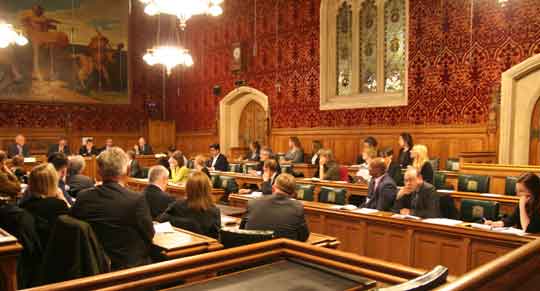
We estimate that 37,960 leasehold houses have been registered on the Land Registry since 2010.
It has hugely increased: 3,420 leasehold houses were registered in 2010; that became 8,775 in 2015. Figures for 2016 are still coming through. They are 8,230 to date, but we are only getting into December registrations now.
Since we began this campaign, persuading the Guardian to take it up – and I want to pay tribute to Patrick Collinson, the newspapers personal finance editor who spoke at our last APPG on December 14 – we have inviting leaseholders of houses and flats with onerous ground rent terms to fill out an online survey.
The results are hugely weighted towards the North West and Taylor Wimpey.
Taylor Wimpey because it came up with the extraordinary idea that doubling ground rents were a good idea at sites built between 2007 and 2011. The North West because of the activities of the women present here, who have formed a 3,000-strong Facebook group called the National Leasehold Campaign.
There are some interesting findings from our survey, which we will share, in confidence, with senior civil servants in the DCLG.
429 of these responses were house buyers and 263 of them were from Taylor Wimpey customers.
Of those 200 said they faced doubling ground rents and 169 faced ground rents rising with RPI.
The really interesting finding concerns the solicitors.
With highly ingenuous marketing, housebuilders have made the homebuying process something akin to an impulse buy at the end of a supermarket queue.
With a stroke of the pen, a consumer can sign up for solicitors, mortgage advisors, additional fixtures and fittings for a house.
The pressure to use the developer’s recommended solicitor in order to complete in time to qualify for Help To Buy and within a bogus deadline dreamed up by the sales team is considerable.
71% of respondents said they had used the solicitors recommended by the developers.
Bannister Preston, a legal chain in the North West, accounted for 45% of all the conveyancing at Taylor Wimpey sales.
All of these respondents replied no to the question: Did the solicitors indicate that the ground rent terms would affect the resale value of the property?
41% of Taylor Wimpey respondents said that they used the government’s Help To Buy scheme.





 Why are leasehold house owners mobilising while flat owners suffer in silence?
Why are leasehold house owners mobilising while flat owners suffer in silence?






















A lot of people don’t have much contact with solicitors and we don’t get to ‘instruct’ them very often to act on our behalf, therefore we are just grateful when someone recommends a firm. I for one only ever ‘ instructed’ solicitors when I bought my little flat. I have never been in any sort of conflict with anyone, therefore not an equal battle with the freeholder. The freeholder has solicitors on tap.
How am I supposed to compete with that? It’s the law that needs to change and be brought up to the 21st c… leaseholders should become homeowners rather than cows to be milked.
It’s ironic that Bannister Preston are, like all the other firms involved in this fiasco, members of the so called `Conveyancing Quality Scheme’. This was set up by the Law Society to drive small, independent forms of solicitors out of conveyancing and direct house buyers towards the conveyancing factories, where the conveyancing can be dealt with by mostly unqualified `conveyancing executives’.
As with all such stupid window-dressing schemes it’s a triumph of style over content. It doesn’t matter how poor the advice is, provided it’s delivered in a way that enables the solicitors to tick the right boxes.
Accepting instructions via developers is one of the most glaring examples of a conflict of interest that it’s possible to envisage. What solicitor in one of these firms is going to warn a client not to proceed if it means that the lucrative stream of instructions from the developer will dry up immediately?
The Law Society / SRA should explicitly forbid firms from accepting instructions via developers and make it a disciplinary offence to do so.
But I’m not holding my breath.